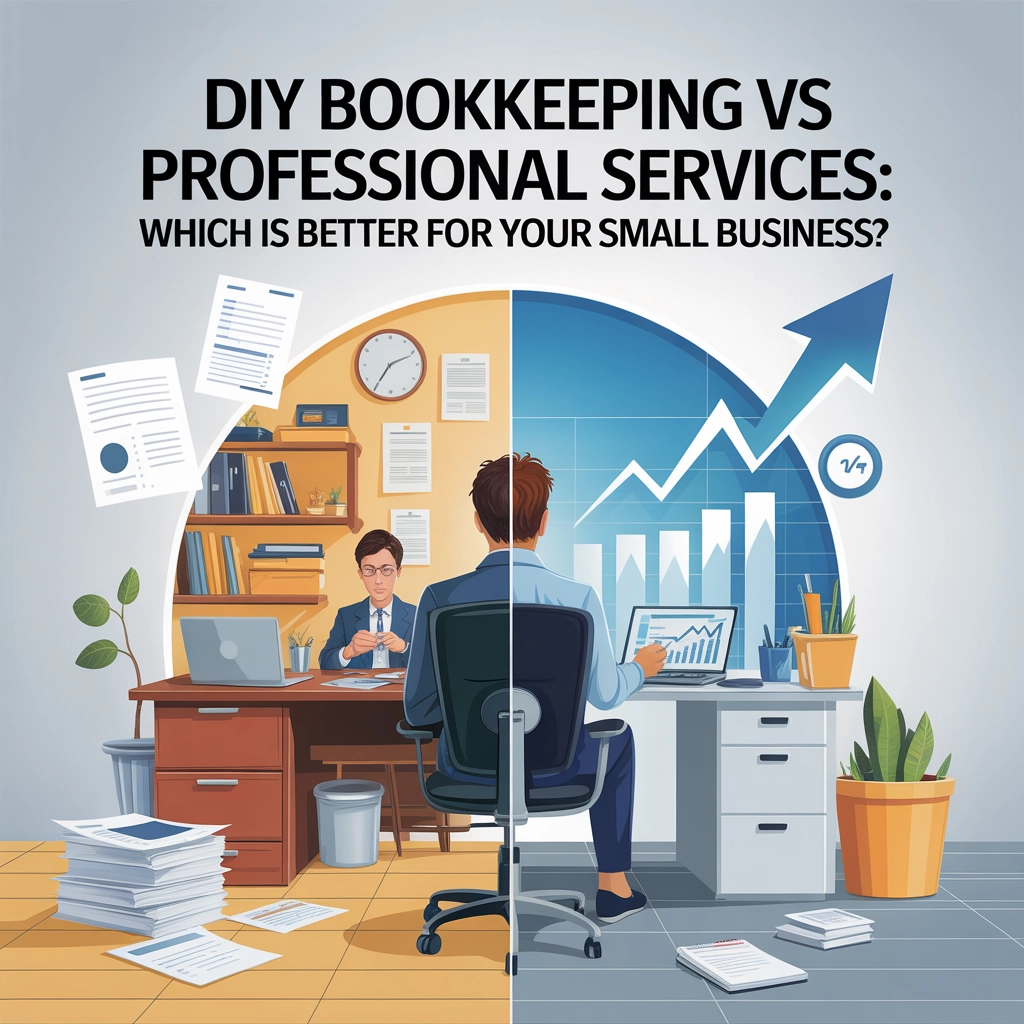DIY Bookkeeping Vs Professional Services: Which Is Better For Your Small Business?

As a small business owner, you've probably found yourself staring at a pile of receipts at 11 PM, wondering if you should tackle your books yourself or just hand everything over to a professional. Trust me, you're not alone in this dilemma!
The truth is, there's no one-size-fits-all answer. Some businesses thrive with DIY bookkeeping, while others desperately need professional help. Let's break down both options so you can make the best choice for your unique situation.
The DIY Bookkeeping Route: Rolling Up Your Sleeves

The Good Stuff About DIY
You'll Save Money (At Least Upfront)
Let's be honest – this is probably the biggest draw. Instead of paying a professional $200-500 per month, you might only spend $20-50 on bookkeeping software like QuickBooks, Xero, or Wave. For a brand-new business watching every penny, that's a huge difference.
You'll Actually Understand Your Finances
When you're the one categorizing expenses and tracking income, you develop an intimate knowledge of where your money goes. You'll start noticing spending patterns, seasonal trends, and financial habits that might otherwise fly under the radar.
Complete Control Over Your Data
Some business owners feel more comfortable keeping their financial information in-house. You decide when to update records, how to organize everything, and who has access to your sensitive data.
Flexibility on Your Schedule
No need to wait for appointments or coordinate with someone else's timeline. You can update your books at midnight in your pajamas if that's when inspiration strikes (or when you finally find the time).
The Not-So-Great Parts
It's a Serious Time Commitment
Here's where many small business owners underestimate the real cost. You might spend 5-10 hours per week on bookkeeping tasks – time you could be using to grow your business, serve customers, or just take a well-deserved break.
Mistakes Can Be Expensive
One misclassified expense or missed deduction could cost you hundreds or thousands during tax season. Without professional training, it's easy to overlook important tax benefits or make errors that trigger audits.
Limited Tax Optimization
Sure, you can use tax software, but do you really know all the deductions you're entitled to? Professional bookkeepers stay current on tax law changes and can spot opportunities you might miss.
Professional Bookkeeping Services: Bringing in the Experts

Why Professional Services Rock
Accuracy You Can Count On
Professional bookkeepers live and breathe financial compliance. They know the tax codes, understand proper categorization, and catch errors before they become problems. This expertise often pays for itself during tax season.
Get Your Life Back
Instead of spending weekends wrestling with spreadsheets, you could be networking, improving your products, or actually enjoying some downtime. Professional services free up your most valuable resource – your time.
Strategic Financial Insights
Good bookkeepers don't just record transactions; they provide valuable insights about your business health. They can spot cash flow issues early, identify profitable trends, and help you make data-driven decisions.
Tax Season Becomes Much Less Stressful
When tax time rolls around, your books are already organized and compliant. No more panic-inducing all-nighters trying to sort through a year's worth of receipts.
The Trade-offs
Higher Costs
Professional bookkeeping typically runs $500-1500+ per month, depending on your business complexity. For some small businesses, this represents a significant monthly expense.
Less Direct Control
You'll need to trust someone else with your financial data and rely on their processes. This requires finding a reliable, trustworthy professional – which isn't always easy.
Potential Communication Gaps
Sometimes there can be delays in getting reports or answers to questions, especially if you're working with a busy firm that serves many clients.
When DIY Makes Sense

DIY bookkeeping can work well if you:
Have a simple business model with straightforward transactions
Enjoy working with numbers and have some basic accounting knowledge
Are just starting out and need to minimize expenses
Have consistent time to dedicate to bookkeeping tasks
Use quality accounting software that guides you through processes
For example, a freelance graphic designer with a handful of regular clients might do just fine managing their own books. The transactions are relatively simple, and the volume is manageable.
When to Call in the Professionals
Professional services become essential when:
Your business is growing rapidly and transactions are becoming more complex
You're spending more than 10 hours per week on bookkeeping
You've made costly mistakes that could have been avoided
You need strategic financial guidance for business decisions
Tax compliance requirements are becoming overwhelming
You run an e-commerce business with inventory, multiple sales channels, or complex transactions
Consider a restaurant owner dealing with inventory, payroll, tips, multiple payment methods, and food cost tracking. The complexity alone makes professional help almost a necessity.
The Hybrid Approach: Best of Both Worlds?
Some businesses find success with a hybrid model – handling day-to-day transaction recording themselves while having a professional review and optimize their books monthly or quarterly. This can provide cost savings while ensuring accuracy and compliance.
Making Your Decision: A Practical Framework
Ask yourself these questions:
How much is your time worth? If you bill $100/hour as a consultant, spending 8 hours monthly on bookkeeping costs you $800 in opportunity cost – potentially more than hiring a professional.
How complex is your business? Multiple revenue streams, inventory, employees, or regulatory requirements usually justify professional help.
What's your comfort level with numbers? If financial statements make you break out in a cold sweat, professional services might be worth the investment for peace of mind alone.
What are your growth plans? If you're planning to expand, apply for loans, or attract investors, having professional-grade financial statements becomes crucial.
The Bottom Line
There's no shame in starting with DIY bookkeeping and transitioning to professional services as you grow. Many successful businesses follow this exact path. The key is being honest about your capabilities, available time, and business complexity.
If you're leaning toward professional services, Bookkeeping Made Simple specializes in helping small businesses just like yours. We understand the unique challenges you face and can provide the expertise you need without the complexity you don't want.
Remember, good bookkeeping – whether DIY or professional – is an investment in your business success. The goal isn't just to satisfy the IRS (though that's important too!); it's to give you the financial clarity you need to make smart business decisions.
Whatever path you choose, make sure it supports your ultimate goal: building a thriving, sustainable business that gives you the life you want. Sometimes that means doing everything yourself, and sometimes it means knowing when to ask for help.
Your business deserves accurate, compliant financial management. The question isn't whether you need good bookkeeping – it's how you're going to get it.
